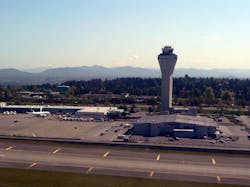Seattle-Tacoma International Airport Moves a Step Closer to Funding Aviation Biofuels
Carbon reduction leaders Carbon War Room (CWR) and SkyNRG join with the Port of Seattle to announce recommendations for long-term funding mechanisms that could supply all airlines at Seattle-Tacoma International Airport (Sea-Tac) with sustainable aviation biofuels.
The results are outlined in a study that reviews a broad spectrum of airport funding sources to cover the higher cost of biofuel, as well as biofuel supply chain infrastructure investments. The study, published today, was conducted by CWR and SkyNRG, in partnership with the Port.
“The information contained in this study will help us take the next steps toward our goal of making biofuel available, cost-effective and practical for all airlines at Sea-Tac," said Port of Seattle Commissioner John Creighton. “It wouldn’t have been possible to get to this point without the momentum provided by our partners, industry leaders and community innovators.”
The two biggest challenges facing broader adoption of sustainable aviation fuel at Sea-Tac are the higher cost compared with petroleum jet fuel, and the constraints imposed by state and federal regulations on use of airport funds.
The report, titled Innovative Funding for Sustainable Aviation Fuel at U.S. Airports: Explored at Seattle-Tacoma International, reveals the financial tools available to U.S. airports, and outlines legal constraints and financial impacts of each tool. The report found that no single tool could generate enough funding to cover the higher cost of biofuel, and recommended combining a number of funding tools.
“Until we reach fossil-price parity, we need co-funding mechanism to close the price gap between conventional jet fuel and sustainable aviation biofuels. Sea-Tac demonstrates that airports can play a key role in helping find the right partners to cover the premium and accelerate the transition to secure a sustainable future for the aviation industry,” said Theye Veen, Chief Financial Officer of SkyNRG.
“We congratulate Sea-Tac on its leadership in showing that airport authorities are critical to the success of the aviation biofuel industry,” said Adam Klauber, Director of CWR’s Sustainable Aviation program. “We’ve proven that there are viable funding mechanisms for the widespread uptake of sustainable aviation fuel at Sea-Tac, and we hope that the study provides tools and ideas for other ambitious airports to consider in their sustainability initiatives.”
